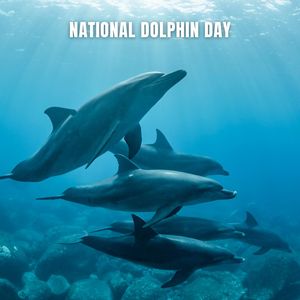National Dolphin Day USA
National Dolphin Day is an annual observance in the United States dedicated to the celebration and protection of dolphins. It is observed every year on April 14th, and is a day to raise awareness about the importance of dolphins and the role they play in the ecosystem.

Dolphins are aquatic mammals in the infraorder Cetacea, which also includes whales and porpoises. There are 40 extant dolphin species that belong to four families: oceanic dolphins (Delphinidae), Ganges and Indus river dolphins (Platanistidae), New World river dolphins (Iniidae), and brackish dolphins (Pontoporiidae).
Dolphins are highly intelligent and social creatures that inhabit oceans and rivers around the world. They are known for their playful behavior and are often regarded as one of the most beloved and fascinating marine species. Despite their popularity, dolphins face a range of threats from human activities, including dolphin drive hunting, by-catch during commercial fishing or shark culling, being captured from the wild to be kept in captivity, agricultural and industrial pollutants (pesticides, plastics, heavy metals), collisions with boats, and climate change.
National Dolphin Day serves as an opportunity to educate people about the importance of dolphins and the challenges they face. Many organizations and individuals use the day to host events and activities aimed at raising awareness about dolphins.
One of the most prominent organizations working to protect dolphins is the Dolphin Project, founded by renowned animal rights activist and former dolphin trainer Ric O’Barry. The organization works to end the exploitation of dolphins in captivity and in the wild, and to raise awareness about the dangers of dolphin captivity and the importance of protecting these animals in their natural habitat.
2007 was declared to be the International Year of the Dolphin. The U.N. Convention on the Conservation of Migratory Species of Wild Animals (C.M.S.) established this to reduce the loss of biodiversity by 2010.[1]
2009 marked the release of The Cove an American documentary directed by National Geographic Photographer Louie Psihoyos, which exposed the shocking realities of dolphin hunting in Japan. The film earned the prestigious Academy Award for Best Documentary Feature in 2010 and played a crucial role in raising awareness about the devastating impact of such practices on dolphin populations.
On September 12, 2021, a super-pod of around 1,428 white-sided dolphins were driven into a shallow bay in Skálabotnur, one of the islands in the Faroe archipelago. The dolphins were then killed by local fishermen using hunting techniques known as the grindadráp or "grind."